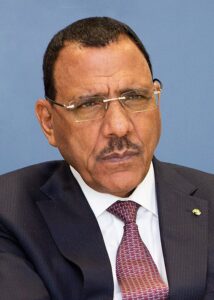by Will Beeker
On July 26, Nigerien President Mohamed Bazoum was detained by presidential guards in his own home, which marked the beginning of a coup which is still ongoing. Bazoum fled to a safe room, calling global leaders for help, while the next day General Abdourahmane “Omar” Tchiani appointed himself head of the country’s new military government. The international backlash has been swift.
The E.U. has suspended financial support to the Nigerien government and President Biden called for the release of Bazoum and his family. On August 19, a delegation from the Economic Community of West African States (ECOWAS) met with Tchiani and with Bazoum. After the meeting, Tchiani proposed a three-year transition of power, although the specifics have yet to be revealed.
The West, along with West African states such as Nigeria, have voiced strong criticism of the coup’s leaders and called for Bazoum to be reinstated immediately. Meanwhile, neighbors Mali and Burkina Faso, which have seen similar coups in recent years, have voiced support for the junta and formed the Alliance of Sahel States to defend each other in the case of foreign, military intervention.
On October 10, the Biden administration officially declared the military takeover a coup, a designation the administration had been avoiding because of its major ramifications on US aid to Niger. As a result, about $650 million in assistance will be suspended, and the US must halt all economic and military aid to Niger until democracy is restored. However, humanitarian assistance will be allowed to continue, as will some of the US’s military operations.
Why did this happen?
We can only speculate on the exact causes of the coup, although its leaders have cited economic woes and extremist violence under Bazoum. These arguments, however, are dubious, given Niger’s strong economic growth in 2022 and Bazoum’s short time in power. Bazoum was elected president in April 2021, the country’s first transfer of power between two civilians since the country’s independence in 1960. He took control of the economy one year into the Covid-19 pandemic and has only had two years to turn things around, which he was starting to do.
Regarding security concerns, Niger has been no exception to the attacks from extremist groups plaguing the Sahel, but fatalities from violence fell by 40% in the first 6 months of this year. The country has also fared much better than its neighbors Mali and Burkina Faso, which have both undergone coups and turned to Russian mercenaries from the Wagner Group for help with security, a solution that has proven counterproductive.
According to one expert from the Carnegie Endowment for International Peace, the most likely explanation for the coup is that “certain army officers wanted to maintain their positions and influence over political power and block any attempt by the civilian president [Bazoum] to sideline the military’s influence.” Niger has a long tradition of military interventions in government and the country has seen more military officials as presidents than civilians. Since 1960, Niger has had four successful coups and dozens of attempted coups, including a coup two days before Bazoum took office.
How is Wells Bring Hope affected?
With Niger’s border closed immediately following the coup, Wells Bring Hope could not get drilling materials and well supplies into the country, but since drilling is usually slow or paused during the hot summer months, operations were not seriously impacted. In the last month or so, there has been some loosening of border restrictions, particularly for NGOs like Wells Bring Hope, so well drilling has resumed on schedule.
This is not the first coup to take place since Wells Bring Hope started working in Niger and it will not deter us from continuing to help those in need. We will do everything possible to continue our work while prioritizing the safety of our team on the ground. We are incredibly lucky to be partnered with World Vision, an NGO that has a wealth of experience in West Africa and is no stranger to operating during moments of political upheaval. In times of political instability, it’s ordinary citizens who suffer most, and help from the outside world becomes more important than ever, so Wells Bring Hope and World Vision will continue to focus on our mission of saving lives with safe water.
https://www.aljazeera.com/features/2023/8/20/timeline-what-has-happened-in-niger-since-the-coup
https://carnegieendowment.org/2023/08/31/niger-coup-s-outsized-global-impact-pub-90463
https://www.nytimes.com/2023/08/16/podcasts/the-daily/niger-coup.html
https://www.cnn.com/2023/10/10/politics/us-niger-coup-determination/index.html



